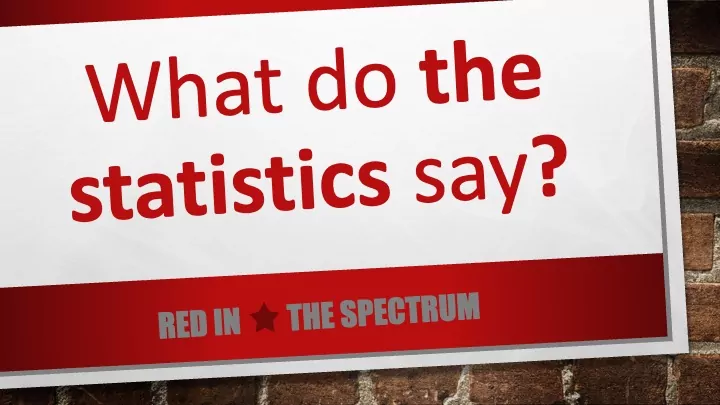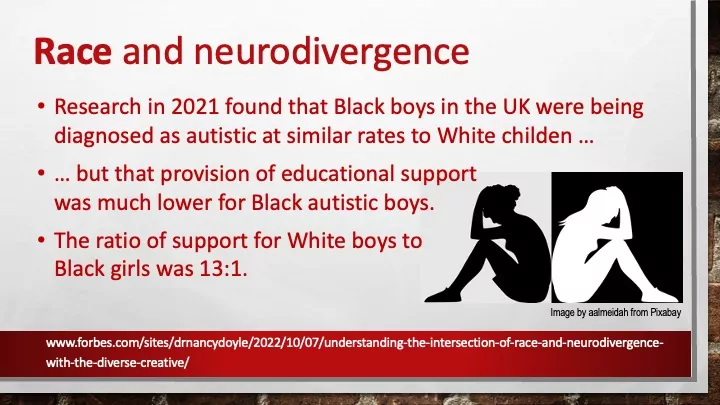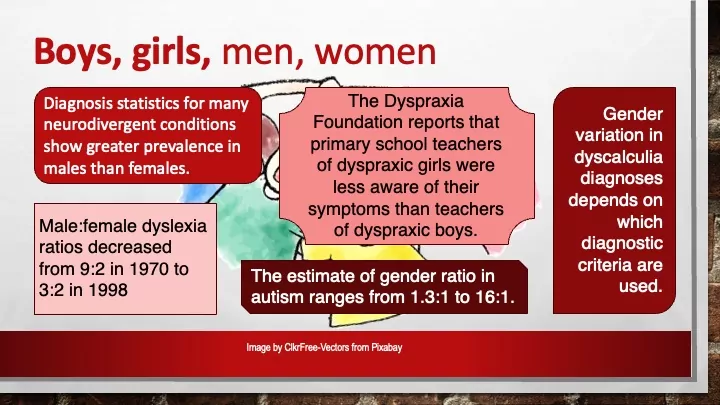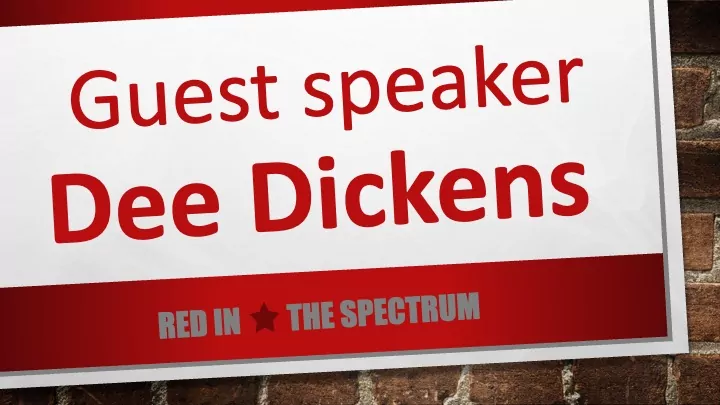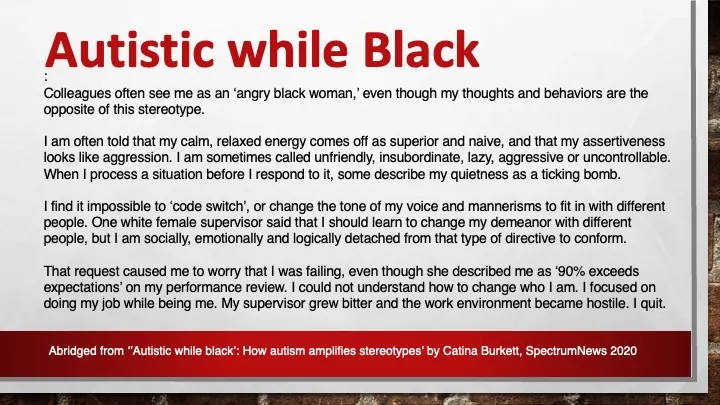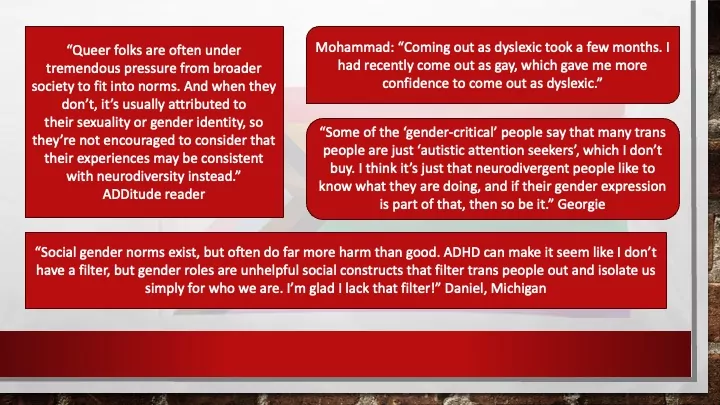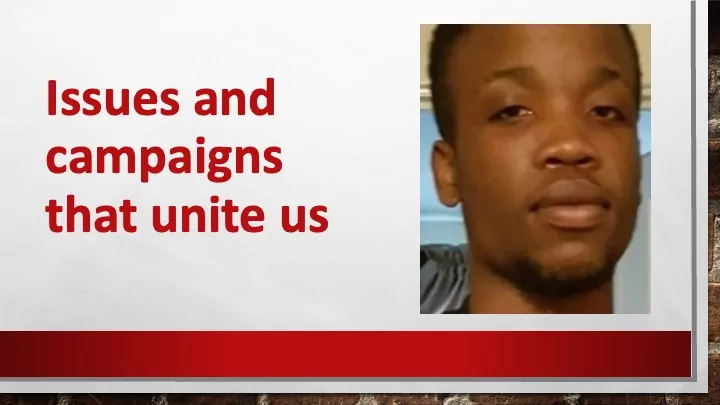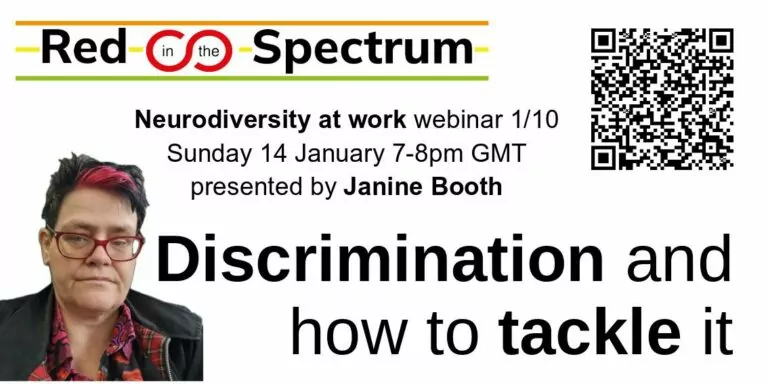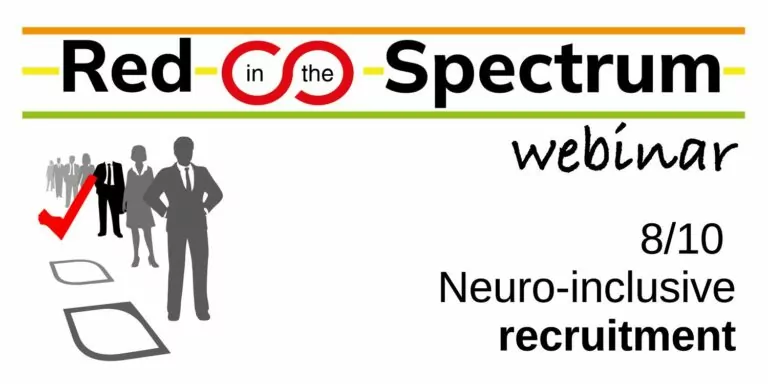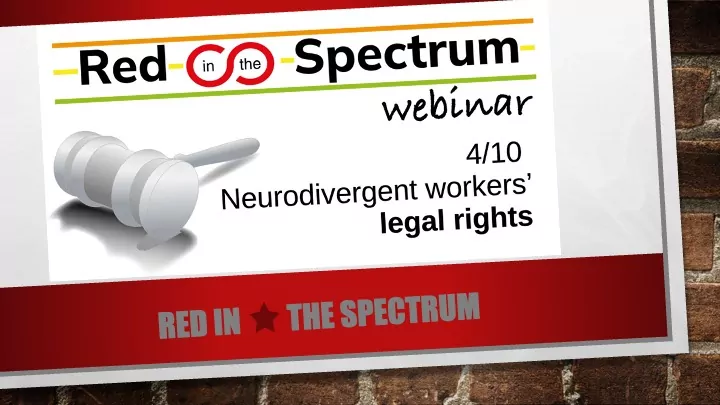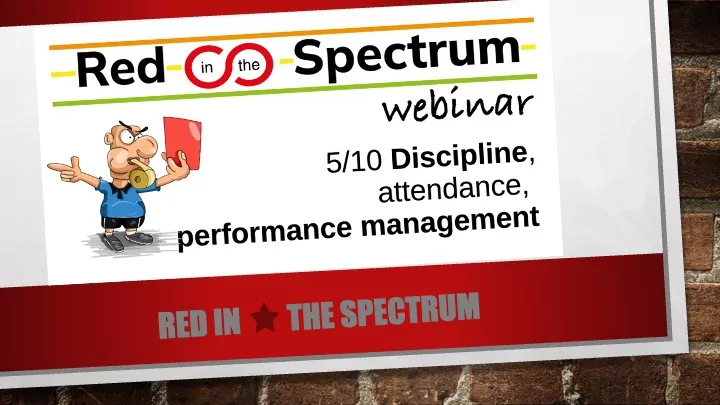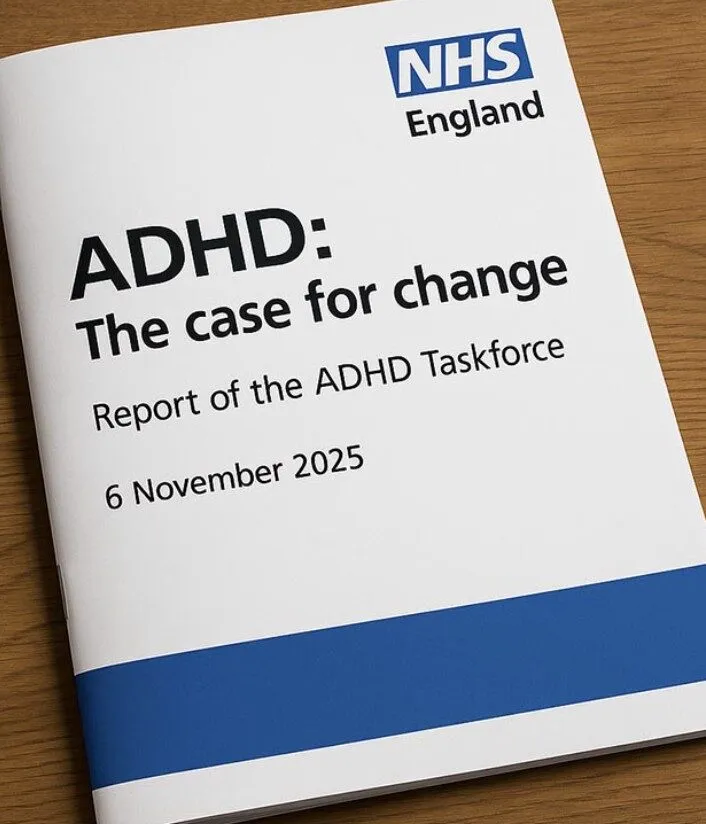Intersectionality: Neurodivergence and other identities: Webinar 6
Intersectionality: Neurodivergence and other identities
On Sunday 18 February, the sixth of Red in the Spectrum’s series of ten Sunday evening Neurodiversity at Work webinars discussed intersectionality: neurodivergence and other identities. We looked at how the intersection of neurodivergence with aspects such as race, sex, sexuality and gender identity impacts on experiences, particularly at work.
By ‘intersectionality’, we mean the way in which people experience discrimination and oppression arising from different aspects of their identities, not as separate experiences, but in combination.
This post contains all the material about intersectionality that we presented in the webinar, and some of the contributions from participants.
Intersectionality: What do the statistics say?
Race and neurodivergence
- Research in 2021 found that Black boys in the UK were being diagnosed as autistic at similar rates to White children …
- … but that provision of educational support was much lower for Black autistic boys.
- The ratio of support for White boys to Black girls was 13:1.
- Similar disparities exist for eg. dyslexia.
- Researchers have been calling for more analysis of race/neurodivergence intersectionality for many years.
Boys, girls, men, women
- Diagnosis statistics for many neurodivergent conditions show greater prevalence in males than females.
- The estimate of gender ratio in autism ranges from 1.3:1 to 16:1.
- Gender variation in dyscalculia diagnoses depends on which diagnostic criteria are used.
- The Dyspraxia Foundation reports that primary school teachers of dyspraxic girls were less aware of their symptoms than teachers of dyspraxic boys.
- Male:female dyslexia ratios decreased from 9:2 in 1970 to 3:2 in 1998
“Research is showing more equal distribution between the genders, and this is turn is helping us to understand that our diagnostic criteria – and subsequently our interpretations of the diagnostic criteria – are gender biased.”
Click here for the source of this information about intersectionality of gender and neurodivergence.
Sexuality, gender identity
- Autistic people might be three times more likely to identify as trans.
- Trans people are three to six times as likely to be autistic as cis people.
- Autistic adults and adolescents are around eight times more likely to identify as asexual and ‘other’ sexuality than their non-autistic peers.
- Autistic males are 3.5 times more likely to identify as bisexual than non-autistic males.
- Autistic females are three times more likely to identify as homosexual than non-autistic females.
The source of this information about intersectionality of sexuality, gender identity and neurodivergence is: Warrier, V., Greenberg, D.M., Weir, E. et al. Elevated rates of autism, other neurodevelopmental and psychiatric diagnoses, and autistic traits in transgender and gender-diverse individuals. Nat Commun 11, 3959 (2020).
- Of seventeen articles published between 2014 and early 2022 about the intersection of transgender/gender diversity and ADHD, twelve (71%) reported a prevalence, based on medical records.
The source of this information about intersectionality of gender identity and neurodivergence is: Teddy G. Goetz & Noah Adams (2022) The transgender and gender diverse and attention deficit hyperactivity disorder nexus: A systematic review, Journal of Gay & Lesbian Mental Health
However
- Nearly all statistical evidence relates to autism, and to a lesser extent, ADHD. Evidence is lacking of an association between, say, being dyslexic and bisexual, dyscalculic and lesbian, etc.
- The statistical evidence relies on reporting — people telling the investigator about how they identify.
- Statistics can show only correlation, not cause.
Guest speaker on intersectionality: Dee Dickens
Follow Dee:
- on Facebook here:
- … and on Twitter/X and Instagram @goddessdeeva (not work-friendly accounts, as they include Dee’s writing as a disability-inclusive sex blogger)
We welcomed our guest speaker about intersectionality, Dee Dickens, who said …
My name is Dee Dickens. I am female-presenting, disabled, black and queer. The only box I don’t tick anymore is young. And honestly, with its expectations and insecurities, you can keep that one.
I am also autistic with ADHD, so it took me a long while to write this as there was so much shiny stuff going on I was distracted.
I am what I like to call a sensory-seeking, experience-excited, rulebreaking person and I now put all of who I am down to my neurotype.
To explain …
I have the autistic trait of not obeying, but it isn’t because I have a thing about authority (though I really do, who put you in charge? Why?) but because the rules make no sense. I mean, what is the obsession with eye contact? And you know what I found out? Neurotypicals don’t do it either. Not properly. Most people who are professing to make eye contact are actually looking between your eyes at the part where the mono brow would be if you weren’t bullied into plucking to within an inch of your life. No one tells us that, do they?
The reason I decided I was queer as a kid was that I couldn’t really think of a reason not to be. The idea of loving someone because of a set of genitals made, and still makes absolutely no sense. Neither does the idea of a binary. Or religion. Or a million other things that perplex me day to day. I am doing a PhD in the Neurodiversity Paradigm and the Social Model of Disability as I am fed up with medical and pity models. Worse, the inspiration porn we are supposed to provide.
I’m a non-binary person, like what you would get if you ordered Woman off wish.com. It is mostly woman, but there is something a bit off about it. And that is probably down to my belief that there is more to it than being able to have babies. Do we stop being women once we hit menopause? If I am ‘barren’ – and that is an awful term, isn’t it? ‘Barren’ has connotations of being useless and that is pretty much how women are seen – if I cannot reproduce, does that mean I am no longer a woman?
See? There are so many questions that makes the whole idea of biological ‘females’ ridiculous, but they don’t like being called ridiculous, so they portray us as weirdos and infantilise us. They have programmes called ‘Love on the Spectrum’ and ‘The Undateables’ which are spiritually akin to watching the mentals in Bedlam back in the day and they wonder why so many of us don’t make it.
‘Different, not broken” is something we say, but how many of us, faced with a society that tries to make us feel grateful that it allows us to exist, have internalised that?
In the 70s, we were told “Black Is Beautiful”, but it has taken decades and generations to even start to internalise what that means. Our natural hair is still seen as unprofessional, yet white people are ‘spiritual’ when they have a head full of grinch fingers.
So, what do we do? For me, I make the Neurodiversity Paradigm – which tells us that there is no such thing as a normal brain – I make it a way of life. I say things like, “They are worried about the uptick in diagnoses because what happens when we realise there are more of us than them and start saying out loud that we won’t follow stupid rules?” And I say it with a straight face.
Our identities are important because we are not a single entity: The Neurodivergent!
We are as diverse as we are interesting. We are as different to each other as we are hilarious. And we are painted as not having empathy so that we can be more easily othered. That we can be a collection of traits for them to identify and dismiss.
And we are told to sit still, to not talk so much about what we like, to act more normal, to make bloody eye contact, to touch people we don’t want to touch, to give way to our neurotypical betters.
Well, no more.
Tell me about your special interests. Info dump on me as hard as you like and I will stim happily while you do. Elbow bump me instead of shaking my hand. Tell me that you are not in a huggy mood today. Dance while you eat, make the happy hum noise that comes with ice cream. Make jokes about our community, I will laugh with love. Look wherever is comfortable when we talk.
Ask for what will make you comfortable. If the light is flickering, say that you will not go in there until it is replaced. Wear your ear defenders with pride. The world is loud and your identity is valid.
No matter how you identify gender-wise, disability-wise, sexuality-wise, neurotype-wise. Your identity is valid and you are enough.
Those of us who are AFAB [assigned female at birth], older and estranged from family (usually because they tried to abuse the normal into us) are so badly let down by the current assessment guidelines that I no longer see them as relevant. If you say you are neurodivergent, that is enough for me. Self- and peer diagnosis is valid.
I’m leaving some of my time for questions, but as it is customary to end on a quote, here is the one by Dr Kimberly Douglass that is giving me life right now.
“Decolonizing neurodivergence is more than a single statement, a single act, a single event, a single product or a single service. This is a way of life that deconstructs, that questions, that challenges.” Dr Kimberly Douglass – 2022
Comments about Dee’s talk on intersectionality from participants:
I love rules, as long as I’m the one making them, because other people’s rules rarely make sense.
Topographical agnosia [‘place blindness’] is a fun one. I also managed (somewhat foolishly) to pick prosopagnosia [‘face blindness’] off the list.
Hugely important, especially with the youth I’ve been working with who often identify as their disability or disorder while rejecting the rest of the unique things that make them… well them!
Yessss – decolonising is important.
My favourite thing that validates my academic identity is this one.
This was the article that made me realise I had ADHD.
Performing femininity is exhausting!
Q: How can we best navigate conflicting access needs within our communities? eg. one autistic person talks loudly and a lot, and another autistic person is sound sensitive and needs a quieter space? I don’t want my comfort to be the source of another’s discomfort.
A: Usually, you can negotiate an arrangement that meets both people’s needs.
Response: An Autistic guy and I happily managed out way through an uncomfortable social thing at work. He likes talk, I like silence. He sat and talked at me, I wasn’t listening and had earplugs in. We were both happy and unbothered by anyone else.
My favourite experience in finding my late-diagnosed ADHD is being told by a neurotypical psychiatrist that I couldn’t possibly have ADHD because I was successful, dressed well, and had a nice purse – and that it was probably just anxiety.
I’ve lost count of all the things that have gone wrong over the years and have taken way longer than necessary to diagnose simply because they were initially dismissed as ‘anxiety’ – it’s like it’s a script!
Estranged here, 43. Sure I’m autistic (AuDHD?). Assessor told me I can’t be because I’m good at writing!
What do the people say?
Intersectionality: Race and neurodiversity
Autistic while Black
“Colleagues often see me as an ‘angry black woman,’ even though my thoughts and behaviors are the opposite of this stereotype.
I am often told that my calm, relaxed energy comes off as superior and naïve, and that my assertiveness looks like aggression. I am sometimes called unfriendly, insubordinate, lazy, aggressive or uncontrollable. When I process a situation before I respond to it, some describe my quietness as a ticking bomb.
I find it impossible to ‘code switch’, or change the tone of my voice and mannerisms to fit in with different people. One white female supervisor said that I should learn to change my demeanor with different people, but I am socially, emotionally and logically detached from that type of directive to conform.
That request caused me to worry that I was failing, even though she described me as ‘90% exceeds expectations’ on my performance review. I could not understand how to change who I am. I focused on doing my job while being me. My supervisor grew bitter and the work environment became hostile. I quit.”
Abridged from ‘’Autistic while black’: How autism amplifies stereotypes’ by Catina Burkett, SpectrumNews 2020
Nikki
“As a Romani schoolkid, you get cast as bad and not very social because you’re a a gypsy, you’re a traveller, so that’s the reason you perform badly at school. I wasn’t diagnosed as autistic when I was a child – I’ve only in my 30s been diagnosed.
“When I started school, we just spoke Romani at home, so a lot of my struggles were put down to that. I was born in England, I understand English perfectly fine and I speak English perfectly fine, but my difficulties were put down to my culture.
“I would have a meltdown in school and smash up a classroom, but that wasn’t seen as a special need, that was seen as being Romani and therefore badly behaved – the view that our people don’t discipline their children, they’re rogues, they smash up things, they steal things.
“There was a label on me, and people couldn’t look past that to see that I had special needs.”
From an interview with Neurodivergent Labour: watch the full interview here.
Comments from participants on intersectionality of race and neurodivergence:
“The visibility of race and the invisibility of autism”: a hard space to be.
Yeah, mine wasn’t picked up at all as an Indian woman – only when I was 27.
Q: Understanding that race/ethnicity does mask our ability to recognise neurodiversity, how do we prevent the reverse, meaning how do we prevent us from diagnosing and pathologising cultural traits?
A: We have to do both, sadly. We have to tackle neurodivergence being ignored because of cultural assumptions, and we have to tackle culturally-based behaviours being labelled as diagnosable conditions.I am self-diagnosed autistic, but referred to both ASD and ADHD assessment. I am white eastern European, but my kids were born here. My teenage daughter has had various issues at school, including outbursts in response to being targeted by another kid. I have indicated that she may have special needs and asked for her to be tested / referred. But a lot of what I receive is indifference about any potential learning difficulty. It is so tiresome to face this attitude.
I appreciate that this series has a focus on race. I really feel seen.
Intersectionality: Sexuality and gender identity
“Queer folks are often under tremendous pressure from broader society to fit into norms. And when they don’t, it’s usually attributed to their sexuality or gender identity, so they’re not encouraged to consider that their experiences may be consistent with neurodiversity instead.” ADDitude reader
Mohammad: “Coming out as dyslexic took a few months. I had recently come out as gay, which gave me more confidence to come out as dyslexic.”
“Some of the ‘gender-critical’ people say that many trans people are just ‘autistic attention seekers’, which I don’t buy. I think it’s just that neurodivergent people like to know what they are doing, and if their gender expression is part of that, then so be it.” Georgie
“Social gender norms exist, but often do far more harm than good. ADHD can make it seem like I don’t have a filter, but gender roles are unhelpful social constructs that filter trans people out and isolate us simply for who we are. I’m glad I lack that filter!” Daniel, Michigan
“LGBTQ+ folks tend to have less access to health care, social support, and economic privilege, so they are often less able to get a diagnosis or ADHD medication or support or accommodations even if they do believe they have ADHD.” ADDitude reader
Mohammad: “In the Muslim / Asian community, my parents’ generation want to think that we are all clever, and that if you fail your exams, you are a disappointment. There is not enough awareness of dyslexia. Like being gay, it is perceived as negative, as being unwell. But the younger generation are far, far ahead in their understanding, and are demanding support for neurodivergent people. They don’t keep it secret any more.”
Elisabeth: “I am French, Black, LGBT+ and neurodivergent. The head teacher where I work told me that I got the job to improve the school’s diversity. But I have now been there for five years and I am still the only Black, the only foreign, the only openly LGBT+ and the only openly neurodivergent member of staff.”
“Many of the stereotypes I have to contend with as a person with ADHD are identical to those I have to contend with as a bisexual woman‚ namely that I’m ‘flighty’ and ‘afraid of commitment.” ADDitude reader
Comments from participants on intersectionality of sexuality, gender identity and neurodivergence:
I struggle to get people to understand how I can be non-binary just because I have had three children. How do we get through to people who judge our gender based purely on our genitalia and whether we can (or have had) children?
It’s “The existence of your disability in my vicinity is causing me some mild discomfort. It’s your responsibility to cease to be ‘it’ in my presence.”
It was harder to tell my family I’m neurodivergent than that I’m bi.
I don’t get the whole fascination with genitalia. I mean, it only matters what someone else’s genital look like if you want to rub yours against theirs and you happen to be fussy.
This treatment is why we lose our lives, why we lose our loved ones and why we get angry.
Intersectionality issues and campaigns that unite us: Osime Brown
Osime Brown is a young, Black, autistic, learning-disabled man who was convicted under ‘joint enterprise’ law when someone else in the group he was part of stole a mobile phone. Having been born in Jamaica, he was subject to an automatic deportation order on his release from his prison sentence.
A campaign in his defence involved his family, neurodivergent groups and trade unions, organised protests outside the Home Office and collected over half a million signatures on an online petition. The campaign succeeded in getting the deportation order revoked, and Osime still lives in the UK with his family.
Osime’s story illustrates the intersectionality of neurodivergence with race (and age), and is a model for campaigning that unites both issues and organisations.
A final note: One of the participants at our webinar on intersectionality has set up a ‘kindness’ initiative in Thanet, Kent, in memory of his “beautiful, kind and funny” 15-year-old son Stefan, who died after being bullied for being autistic. You can find out more and support the campaign here.
Following this webinar on intersectionality, there are four more webinars in the series. You don’t have to attend them all – you can attend whichever ones are most interesting and relevant to you.
Whether you attended this week or not, we hope to see you at some point over the next four weeks.
Next week’s webinar is on Working Carers’ Rights. Register here.

